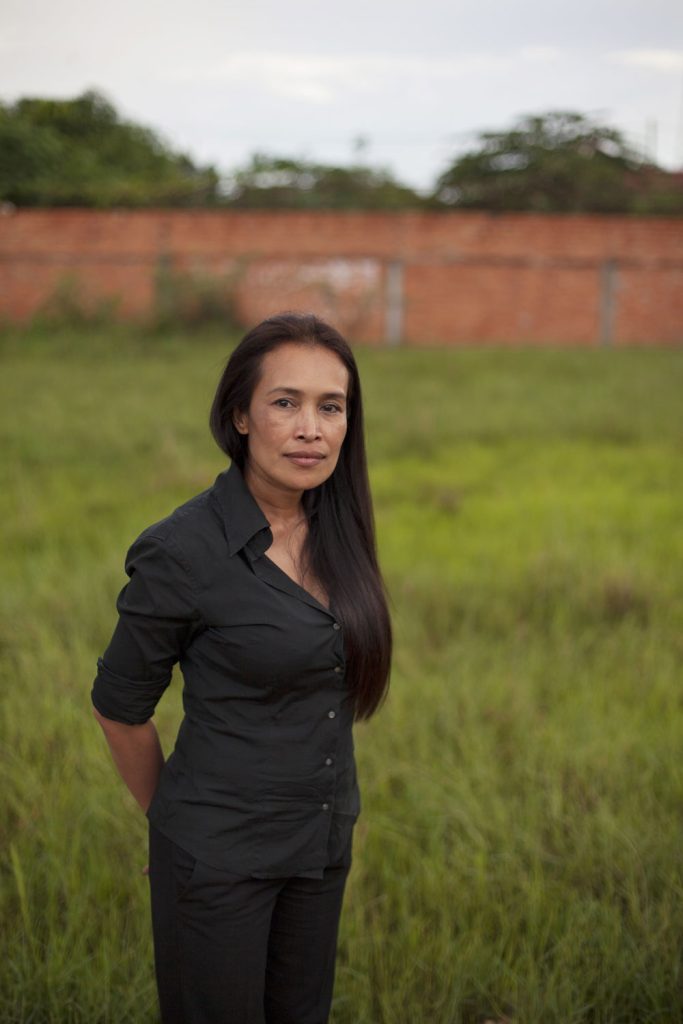She has won the World’s Children’s Prize, the U.S. State Department Heroes of Anti-Trafficking Award, the Prince of Asturias Award for international cooperation, and been named one of The Guardian’s Top 100 Women activists and campaigners. She is Somaly Mam, founder of AFESIP (Agir pour les Femmes en Situation Precaire, or Acting for Women in Distressing Situations), a Cambodian NGO dedicated to rescuing, housing, and rehabilitating sexually exploited women and children in Cambodia, Laos, and Vietnam. She is also the namesake cofounder of the Somaly Mam Foundation, a U.S. nonprofit committed to ending human trafficking and empowering its survivors.
Sold into sex slavery herself as a child, Somaly Mam eventually escaped her captors and has since dedicated her life to rescuing girls from a similar fate—sometimes at great personal risk to herself. She has told her own story in the autobiography The Road of Lost Innocence: The True Story of a Cambodian Heroine, and her experiences were featured in a 2010 PBS documentary based on Nicholas Kristof and Sheryl WuDunn’s book Half the Sky: Turning Oppression into Opportunity for Women Worldwide.
Somaly Mam, like over 90 percent of her fellow Cambodians, is a Buddhist, a fact seldom mentioned in the coverage she receives. In May, I interviewed her via Skype. We spoke in English—her fourth language—about the spiritual side of her life and work.
—Reverend Danny Fisher
Where does the energy and inspiration for your work come from? For me, everything comes from the girls. I think if you could be here and see them, they would inspire you in your life, too, and make things meaningful. I’m very, very lucky to have all these little girls with me. Especially the little, little ones—they never complain about anything that they’ve been through. They go to school now, and they’re happy.
What guides your work ethically and spiritually? What guides me most is what I’ve been through in my own life and what I need. After that, what guides the work is the girls: the NGO today is directed by their ideas. We ask them. We believe that those who have been through the suffering of sex trafficking know best what to do. They have experience others don’t.
How would you say your work has changed you? First of all, I would say that I now think my life is meaningful. Second, I have learned about love. Third, I have learned about forgiveness. And I learn how to be “Happy Somaly,” not like before.
The girls, my girls, are teaching me a lot. All the time. They are always changing my life. They love me without conditions. You know how sometimes you have friendships or other situations in which there are conditions, even if it’s just “I need you to be like this…” The girls are not like that. You know, I’m not “Perfect Somaly.” I’m just Somaly. Sometimes I’m not always a good person. And they just love me. They forgive me. They teach me about unconditional love, and I try to love them that way too. You know, sometimes when you rescue a girl from a brothel, they tell you that they didn’t want to be rescued, they didn’t want to take your hand and get up and leave, and you feel upset. You’re upset because you want them to be helped, and so you end up hurting yourself this way. But then you might think, “Why don’t I just love them? Be with them and love them.” Respect them where they are. And maybe one day they’ll change and see how things are better for them.
So what does discourage you now, and how do you deal with that? When I started, I had a lot of anger because no one who was in a position to do anything about it was asking questions about brothels and the girls in them. It’s easier to point a finger and say, “You’re a prostitute, and it’s your fault.” I wanted to stand up and say, “It’s easy to do that, to point a finger and blame. Why aren’t you asking any questions?” I was so angry.
We didn’t ask to be born into families that wanted to sell us. We didn’t ask to be born in a country that is so poor. We want to be like all of you: born into a warm family, go to a good school, and so on. We wanted to have a mother, to have everything. We had no choice. I wanted to show them. I’ll tell you, I wasn’t a good person: I had a lot of anger. I wanted to help the girls with my hands, because we are the same. We have a silence in our hearts that no one can understand but us. We can’t explain it to other people who point at us. We need to accept it, because it’s our life, but we didn’t want to be born like this—it’s just who we are.
Every day, day by day, things are changing in my life. I’m not angry anymore. I hated men, and now I don’t. It’s not necessarily because good men proved themselves to me, but because I’m trying to see things in a positive way. When I see people saying negative things or acting in negative ways, I try to think, “Maybe they’ve had a difficult life like myself.” So I try to forgive them and talk to them. But I didn’t start out a good person working from a place of love, or anything like that. I learned—from life, from the girls—day by day.
Listening to you talk about the people pointing fingers reminds me of a really powerful passage in your book. You ask of your fellow Cambodians, “Where is your Buddhist morality on the issue of sex trafficking?” What do you think? Why isn’t Buddhist morality kicking in on this issue? You know, it’s a strange thing to be suffering and wondering, “Where are the Buddhists?” [Laughs.] Even with girls being raped and killed, they do nothing. I think this is because we see Buddhism like this: if you do a good thing, good things will happen to you and you will receive great things; but if you do a bad thing, bad things will happen to you. But I remember being a girl in the brothel and thinking, “I’ve not ever done anything bad to anyone. Why is this happening to me?”
One day, one of my girls, who was 4 years old and had HIV/AIDS, asked me, “Mommy, do you believe in God?” I’m looking at her, and I’m thinking, “Well, I pray for the people who are dying at the pagoda, but I’m not sure if I believe in God or Buddhism.” But she looks at me and says, “Mommy, do you believe in God?” I look back at her, and I don’t know why, but I said, “Yes.” And then she said, “The Buddhists say that if we do a good thing, we receive a good thing, but if we do a bad thing, we receive a bad thing. I’m only 4. What did I do? Why do I have to die now?” I said, “Maybe your spirit was reborn this way so that you could be with me in the last moments and receive unconditional love from me.” I don’t know why I explained it to her like this. Maybe I just wanted to escape from the question.
The Dalai Lama inspires me. He told me once, “Peace is always in your mind if you want it.” I’m reading a lot about Buddhism and consider myself a Buddhist right now. I meditate a lot, and it makes me calm. Buddhism seems to say a lot about forgiveness, and that makes me calm. It helps me not hurt myself anymore, and when I don’t hurt myself, I don’t hurt the girls or the people around me or the people who love me.
In your book, you tell one story about how the Buddhist monks at a local monastery helped you by taking in the brother of a girl you saved. Do monks and nuns help and support your organization? I talked with one monk at a local pagoda and now he helps me when boys come to us. It’s hard, though, because we have some good monks and some not-so-good monks. So I deal with the good monks, who are always supportive to all the kids in the villages. I don’t work with the not-good monks. For example, there’s one temple in Phnom Penh that never has space for the poor kids who come to the pagoda. But I always try to look at things in a positive way, not in a negative way. I’m not interesting in criticizing; I want to help make people good. Life is short, and I want to try to educate the people, knowing that nobody is perfect.
What about the nuns in Cambodia? I know that can be one avenue for girls to get educated and advance themselves. In Cambodia, we don’t have many nuns; there are more in Thailand. Often women in Cambodia become nuns when they get older, and sometimes just to escape from things. I’ve talked to some nuns who tell me they don’t know why they became nuns. They might be in pain, they go to the pagoda and feel better, and so they become a nun. If I were going to become a nun, I think I might want to really understand why I’m doing it and what my vows mean. I think Buddhism is about becoming a good person, not just escaping from what hurts.
I’m struck that the way life is organized for the girls—including meditation, chores, education—parallels much of Buddhist monastic life. Was that intentional on your part? No, actually that comes from the girls. Our girls come from many backgrounds—from everywhere. Some are Christian, for example. We don’t discriminate. I love them. We all just want love, community, happiness, and forgiveness. Of course, though, we live in Cambodia, and most of them are Buddhist. The children who have lost their mothers often want to go to the pagoda. Sometimes when they have bad dreams too, they wake up and say, “Mommy, can we go to the pagoda?” It seems like good psychological support: I bring them, and they feel better. The monk comes, they feel better. But again, we don’t want to focus on just one thing; we are open to all girls. And how they live is decided by them, too.
What’s most important to you personally right now? My girls! [Laughs.] You know, I got very sick a while back, and I was just praying for them. I wasn’t worried about dying, I was worried about them. Right now, I’m thinking about how much I want to see my girls in the courtroom as lawyers. I want to see my girls in the foundation as directors. I want to see these girls, these survivors, as part of the solution. They travel a lot, they’re talking to the people about trafficking, about health. One of them is in her first year of law school now. One of them is in her second year of studying psychology. This year four of them are going to graduate from high school, and one of them wants to replace me when the time comes. I want to see them in the political realm. What I want is to see them grow up. I’m excited to see them grow up every day. I want them to tell people, tell men, about respecting each other as human beings. I want people to look at the girls and say, “She was sold when she was 4 or 5—but look at her now! She’s clever like you, she’s as good as anyone, and, in spite of what she’s been through, she respects everyone.” Give me a few years, you’ll see. [Laughs.]
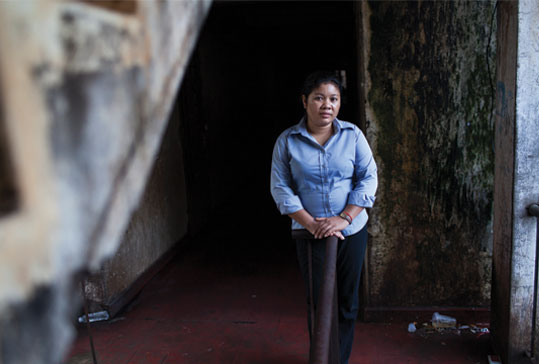
Sopheap Thy
Sopheap lost both of her parents at a young age and married young, but her husband was so violent that she had to divorce him. Trying to support her two daughters alone, Sopheap took her children to stay with her ex-mother-in-law in the countryside while she found a factory job in Phnom Penh, Cambodia’s capital. After working there for three months, a friend she had made at work sold her to a brothel. There, she became dependent on drugs and grew very sick. The brothel owners let her go after two years, but she quickly returned to sex work in Phnom Penh’s notorious White Building, a hub of prostitution, in order to support her children. One day while she was waiting for clients, the police arrested her and referred her to AFE SIP . Sopheap spent nearly four years at the organization’s Tom Dy rehabilitation and vocational training center before joining SMF ’s Voices for Change program in 2009. She is now employed by AFE SIP ’s HIV Outreach Team.
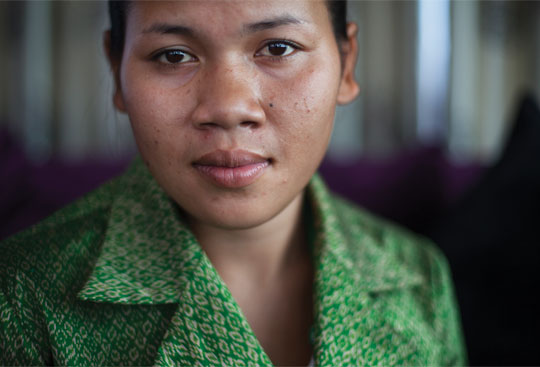
Sreypov Chan
After Sreypov’s father passed away when she was 5 years old, her family’s economic situation deteriorated. Her mother could not afford to support Sreypov and her four siblings. When Sreypov was 7, a woman came to her village and told her and her mother that she could find Sreypov a job in the city as a cleaner. Sreypov left with the woman but was sold into a brothel. After three years of sexual slavery, passed among brothels, Sreypov decided to try to escape. She was 10 years old. Her attempt was successful, and she soon met AFE SIP staff who were doing outreach work in the area. She stayed for eight years at AFE SIP ’s Kampong Cham rehabilitation center for children, where she studied and learned to weave. In 2009 she joined SMF ’s Voices for Change program and is now employed by SMF ’s Advocacy team.
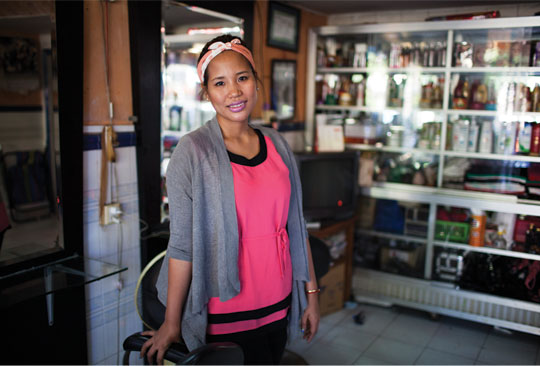
Neang Hok
Neang was sent to the city by her family at the age of 7 for employment as a domestic worker so she could send money home. She was physically and sexually abused by the family she worked for. After 13 years, she left that job and found work at a hair salon where she trained as a hairdresser. Although the husband of the salon’s owner attempted to rape her, Neang did not have any other employment options and didn’t have the capital to open her own shop. One day by chance, Somaly Mam came to Neang’s salon. After speaking with her, Somaly sent AFE SIP ’s investigation team to follow up. They referred Neang to AFE SIP ’s vocational training and rehabilitation program. Since she already had hairdressing skills, she stayed only for six months at the center before she felt ready to run her own business, supported by AFE SIP . In 2009, Neang joined SMF ’s Voices for Change program. She continues to run her own salon, where she trains other sex trafficking survivors.
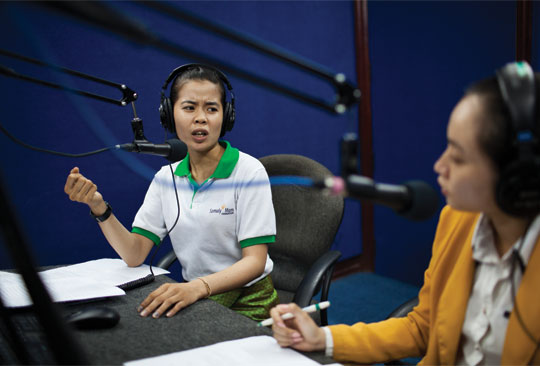
Sreypich Loch
Sreypich suffered through an abusive childhood, kidnapped and trafficked to a brothel at a young age. She was eventually rescued by the police and returned to her family, but then her stepfather began to molest her. Her mother refused to believe Sreypich was being molested, so the girl ran away from home. Once out on the street, she was gang-raped by a group of men. After Sreypich and her parents complained to the police, the authorities referred her to AFE SIP . Sreypich studied hairdressing at AFE SIP ’s Tom Dy center before joining SMF ’s Voices for Change program in 2010. She is currently interning in SMF ’s Advocacy team and hosts a regular radio talk show aimed at educating the broader community on issues of human trafficking and sexual exploitation.
Thank you for subscribing to Tricycle! As a nonprofit, we depend on readers like you to keep Buddhist teachings and practices widely available.
